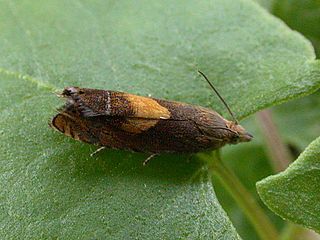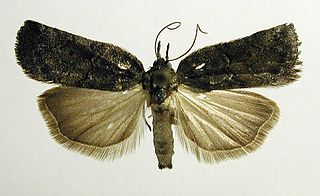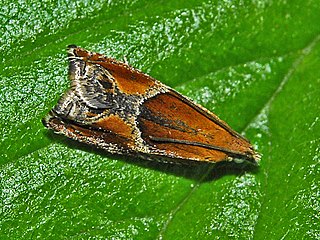
Dichrorampha petiverella is a moth of the family Tortricidae. It is found in the Palearctic realm.

Bactra lancealana is a moth of the family Tortricidae found in Europe. The moth has a wingspan of 11–20 mm. The forewings are pale ochreous or ochreous- brownish, costa strigulated with darker ochreous or dark fuscous; a spot in disc at 1/3 and an angular mark beyond middle dark fuscous, often obsolete, sometimes forming a more or less complete dark median streak from base to apex; central fascia sometimes indicated on costa. Hindwings are grey. The larva is greenish or whitish-fleshcolour; head and plate of 2 black. It is very similar to Bactra furfurana.

Dichelopa is a genus of moths belonging to the subfamily Tortricinae of the family Tortricidae.

Rhopobota naevana, the holly tortrix moth, holly leaf tier or blackheaded fireworm, is a moth of the family Tortricidae. It is found from Europe to eastern Russia, China, Taiwan, Mongolia, Korea and Japan. It is also present in India, Sri Lanka and North America.

Nycteola revayana, the oak nycteoline, is a moth of the family Nolidae. The species was first described by Giovanni Antonio Scopoli in 1772. It is found from Europe and east across the Palearctic to Japan and India.

Dichelopa panoplana is a moth of the family Tortricidae. It is known from Australia, where it widespread in semiarid areas from southern Queensland to South Australia.
Cochylis fusca is a moth of the family Tortricidae. It is known from Mississippi, Illinois, Indiana, Missouri, Ohio and Pennsylvania.
Cochylis virilia is a moth of the family Tortricidae. It is only known from Maine.

Grapholita internana is a moth of the family Tortricidae. It is found in most of Europe, except the Balkan Peninsula and Fennoscandia.

Pammene regiana is a species of moth of the family Tortricidae. It was described by Zeller in 1849. It is found in most of Europe, except the Iberian Peninsula, most of the Balkan Peninsula, Lithuania and Ukraine.

Cochylis roseana is a moth of the family Tortricidae. It is found in most of Europe, Uralsk, Iran, Asia Minor and China (Gansu).

Dichrorampha alpinana, the broad-blotch drill, is a species of moth of the family Tortricidae. It is found in almost all of Europe.

Cochylichroa atricapitana, the black-headed conch, is a moth of the family Tortricidae. It is found in China (Xinjiang) and the eastern Palearctic and most of Europe.

Gynnidomorpha vectisana, the small saltern conch, is a moth of the family Tortricidae. It was described by Henry Noel Humphreys and John O. Westwood in 1845. It is found in China, Japan, Korea, Ireland, Great Britain, Scandinavia, the Benelux, Germany, the Czech Republic, Slovakia, Hungary, Romania, Switzerland, Austria, Italy, Spain, the Baltic region and Russia. The habitat consists of saltmarshes, fens, wet heathland and freshwater marshes.

Pammene populana, the pygmy piercer, is a species of moth of the family Tortricidae. It is found in most of Europe, except Portugal, the Balkan Peninsula and Ukraine. The habitat consists of woodland, marshes, riverbanks, fens and sand dunes.
Dichelopa dichroa is a species of moth of the family Tortricidae. It is found in Australia, where it has been recorded from South Australia, Victoria and New South Wales.

Epinotia nemorivaga, the bearberry bell, is a species of moth in the family Tortricidae. It is found in Europe and Asia.

Ancylis obtusana, the small buckthorn roller, is a moth of the family Tortricidae.

Ancylis unguicella is a moth belonging to the family Tortricidae. The species was first described by Carl Linnaeus in his landmark 1758 10th edition of Systema Naturae.

Dichrorampha plumbana is a moth belonging to the family Tortricidae first described by Giovanni Antonio Scopoli in 1763. It is native to the Palearctic including Europe.















